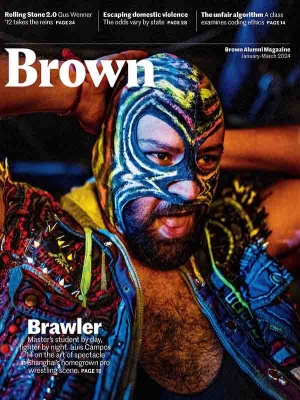Accessible Academic
English professor and prolific author Mari Ruti ’88 was—like the body of work she leaves behind—authentic, irreverent, and wise
Historian Jean Russo ’88 remembers the start of her freshman year in Keeney Quad, where her U-shaped unit had three bathrooms—one on each far end and one in the middle. “We had a unit meeting and decided that the one in the middle would be co-ed,” she says. But then a female student from Finland piped up. Recalls Russo: “She said, ‘Why are we even talking about this? Why don’t we all just shower together?’ And that established Mari as the radical European among us.”
Russo is referring to Mari Ruti ’88, who came to Brown on scholarship from a working-class Finnish family, went on to earn three degrees (including a doctorate) at Harvard, became a distinguished professor in the English department at the University of Toronto, and published more than twelve books, including 2016’s Feminist Film Theory and Pretty Woman—an oft-cited look at the complex mingling of feminist and antifeminist messages in the beloved 1990 movie starring Julia Roberts as an assertive and open-hearted high-class sex worker.
Ruti died of cancer at a Nova Scotia hospital on June 8 at age 59. She had lived five years since an initial breast cancer diagnosis in 2018—four years longer than her prognosis. She is survived by her mother and a brother but also leaves behind a world of colleagues and friends, some of whom started as her students.

One of them, Heather Jessup, a professor in Nova Scotia, remembers having Ruti as professor in a critical theory class at the University of Toronto. “She engaged with us so graciously and generously,” she recalls of Ruti. “She wouldn’t always read the texts she taught ahead of time,” instead choosing to absorb and process the works with her students. She also urged students not to take notes in class, in order to be fully present for conversation.
Jessup says that Ruti was particularly good at bringing clarity to the near-opaque work of theorists including Jacques Lacan, Julia Kristeva, and Hélène Cixous: “She was extremely rigorous, especially as an editor, but she was excellent at making difficult material understandable. She also had a humorous side and a mischievous glimmer in her eyes.” She loved junk-food TV, adds Jessup, and wasn’t above explaining a tricky theoretical passage by referring to Gossip Girl or The O.C.
That irreverence is apparent in her writing, which is refreshingly clear and readable for academic work. In the intro to her Pretty Woman book, after discussing the competing messages of feminism, postfeminism, and antifeminism, she writes: “What makes [the film]...a surprisingly complex object of study is that it walks a tightrope between retrograde, potentially antifeminist themes, and progressive, potentially feminist ones. These…themes slide around unpredictably, compete with each other and generate a veritable mess of conflicting messages about gender and sexuality. My goal is to chart a path through this mess…to elucidate the pleasure that female audiences have…taken in this film….”
In her acclaimed 2018 book Penis Envy and Other Bad Feelings, she subverted Freud’s theory that women begrudge men their phalli; instead, she argued, they desire the power and agency that the phallus symbolized. “For a long time,” she wrote in the opening paragraph with her typical wry bluntness, “Freud has been accused of being a misogynist because he claimed that women suffer from penis envy. I remember that when I first came across this idea in college, I threw Freud’s book across my dorm room and declared him a ‘fucking idiot.’”
Reading Ruti’s work, says Jessup, “is like sitting across the table from her and getting excited by something she’s telling you.” She points to another Ruti book, The Singularity of Being: “It’s about the meaning of life and how we survive loss. It’s like being in conversation with someone you love.”
In another book, 2011’s The Case for Falling in Love, Ruti began by subverting the gender binary assumptions of pop psychology or dating how-to books like Men Are From Mars, Women Are From Venus or The Rules. “Myth: Learning to read the male psyche leads to romantic success,” she wrote. “Fact: There’s no such thing as the male psyche.” She then noted that she’d gotten the idea for the book from a Harvard class she’d taught that she called “On Love,” because, in her words, “I knew that my students would be willing to put up with the agony of having to wade through an unusually difficult reading list as long as they got to talk about love.”
Russo, who often spent holidays with Ruti, says that though Ruti had various romantic relationships, she didn’t have a main one, never married, and remained happily childless. “She was a fiercely independent person and quite adamant about not wanting to be a mother. She had close relationships with my children.”
Jessup says that she last saw Ruti in the hospital the day before she died. “She was in and out of consciousness while I read her lots of notes from friends,” she says, including many who’d raised funds for her to receive life-extending treatment at Boston’s Dana Farber that she could not access via Canadian healthcare.
That final day, says Jessup, Ruti asked her to turn the TV to The O.C. “She was cold and I think watching a show set in California helped her feel warm.” She says she’s glad Ruti left her so much work to read—and re-read. “A beautiful thing about having a writer as a friend,” she says, “is that when they pass away, you still have their books as company. What a gift.”




